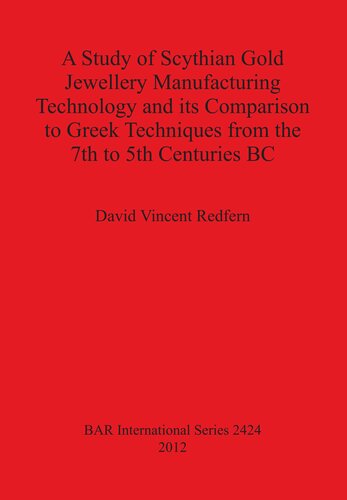

Most ebook files are in PDF format, so you can easily read them using various software such as Foxit Reader or directly on the Google Chrome browser.
Some ebook files are released by publishers in other formats such as .awz, .mobi, .epub, .fb2, etc. You may need to install specific software to read these formats on mobile/PC, such as Calibre.
Please read the tutorial at this link: https://ebookbell.com/faq
We offer FREE conversion to the popular formats you request; however, this may take some time. Therefore, right after payment, please email us, and we will try to provide the service as quickly as possible.
For some exceptional file formats or broken links (if any), please refrain from opening any disputes. Instead, email us first, and we will try to assist within a maximum of 6 hours.
EbookBell Team

4.8
104 reviewsThis comparative study of Greek and Scythian jewellery manufacturing in the North Pontic region is based on a new technique developed by the author over a number of years to produce high-quality images of marks from tools used in the production of metallic artefacts. The macro-laser-imaging-technique was initially developed to overcome the limitations that were encountered when using a binocular microscope for the study of Anglo-Saxon jewellery. In this volume, Greek and Scythian jewellery from three sources was used: the Ashmolean Museum, Oxford, the Staatliche Museen zu Berlin Preussischer Kulturbesitz Antikensammlung, Berlin, and a private collection. The potential of studying the tool marks from artefacts from the north Pontic Region has been shown in aiding researchers in their understanding of the cultural interaction. It is potentially possible to discern which culture had produced the artefact by examining the technological techniques used to produce jewellery. The Scythian craftsmen had to develop techniques which would speed up the production of jewellery because, according to their burial customs, they only had a maximum of 40 days to produce grave goods, whilst the Greek craftsmen worked according to different economic criteria. The Greco-Scythian craftsmen produced artefacts that are in a Greek style but used different manufacturing techniques from those of the Greek craftsmen. These observed technical and qualitative differences provide the justification for a further systematic examination of a much larger collection of jewellery. Were Scythian "masterpieces" in jewellery really produced due to the introduction of gold manufacturing techniques by the Greeks or were they the product of a local and differing technological base?